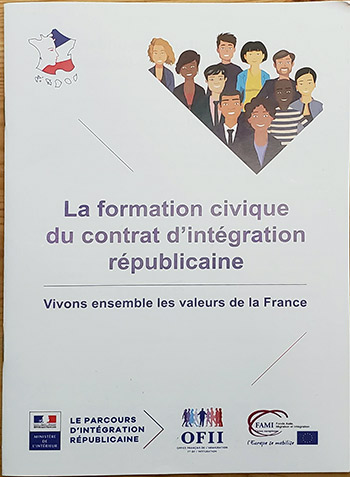OFII Civics training for VLS-TS: VPF
The following is a condensed recap of the four days of civics classes that are required for the visa long séjour valant titre de séjour (vie privée et familiale) VLS-TS VPF. Here you’ll find helpful links, suggestions that my professors gave out and an overall understanding of what to expect in these four days. Here is a general post that I made in terms of the civics days, what to expect, some tips for the four days and how to get there.
Table of Contents
My first class was on Thursday, September 17, 2020 at 8 AM. We actually didn’t start till around 9 AM after all the introductions and formalities were made. The instructor had everyone go around and introduce themselves ; say how long they were in France and what they were doing here. I had 3 different instructors during my 4 days of civics classes.
There are 5 themes for the four days of classes, all focusing around establishing an everyday life in France :
- Discovery
- Health
- Work
- Parenthood
- Housing
These are 5 areas that would be expanded upon through out the 3 full days of courses. On the 4th day, we were allowed to choose an area of our liking to have more precise information. The 4th days was a workshop day and there was a list of about 5 or 6 different options we could choose from.
French Administration Path
There is no right or wrong path to follow when it comes to French administration. I suggest doing as much research as possible to figure out what you need to do and before what date. There are some steps, that depending on where you originate from, have a time limit. All my experience is as an American moving to France. I recommend you looking into social groups or organizations that can help you. I wrote about a few here that have helped tremendously.
Here are the steps I’ve completed within my first year in France.
- Started the process for exchanging my Ohio driver’s license.
- Opened a bank account.
- Applied for a social security number and national healthcare coverage.
- Applied for my French tax number.
Some steps are free or paid (by using something called a timbre fiscal, tax stamp). You will be instructed before hand on how much and what steps to take to obtain the tax stamp.
Discovery of France
France is a unitary state, meaning that the governing system is central and has total power over all of its political subdivisions. These subdivisions must carry out the directives of the central government.
France is a republic. The chief of state is the President (at publication of this post it is Emmanuel Macron) and not a monarch.
France is a democracy. The power of the French Republic comes from her people that elect representatives to govern in their name. A government by the people, for the people.
Principles of France :
The principles of France are as follows :
- Liberté (liberty) : women and men are free in their choice, their convictions, their way of thinking, expression, and living. Individual liberties are guaranteed and each person is expected to respect these liberties.
- Egalité (equality) : every human in France has the same rights and the same duties/obligations.
- Fraternité (fraternity) : includes all members of society that contribute to the greater good and help when needed; the solidarity of the nation.
- Laïcité (secularism) : the separation of political power and the religious organizations within France. Freedom of religion, where everyone is free to choose to celebrate their desired religion, there is no official religion of the State.
Symbols of France :
The symbols of France are as follows :
- Le Drapeau : Blue for Saint Michel, Red for Saint Denis, and white for the anarchy. The French flag was, at first, only red and blue. The militia wore coquards (rosettes) of red and blue. The white was eventually added as a subtle yet distinctive difference between the militia and the rebels.
- Marianne : A symbol of the Republic that combined the classes. Marie was a name frequently used amongst the poor class. Anne was used more frequently amongst the nobles. Thus, Marianne, being a mix of both names, therefore both classes, became the mother of everyone.
- La Coq : Romans and the Greeks referred to the French as galus , or gaulois, the Latin word for rooster. This reference was originally made to make fun of the French. In the end, it became the unofficial symbol of France.
- La Marseillaise : The National Anthem. Originally created as a war song for the army of the Rhine. Claude Joseph Pouget de Lisle wrote it in April 1792. It was adapted as the official anthem of France during the 3rd Republic.
- 14 Juillet / Fête National : Also known as the storming of the Bastille. July 14, 1789. The uprising of the French population against the monarchy and saying enough is enough. The jail was overtaken, the governor captured (and later beheaded) and the prisoners released from their cells. In 1880, the 14 July became the official national holiday.
Healthcare in France
In Case of Emergency :
15 is the number you need to call for SAMU and 18 is the number or the firefighters. If you are unable to hear or have trouble hearing, you can text 114 for help. This service is available 24/7.
The French health system is open and accessible to anyone who lives or works in France. It allows everyone to be treated and covered in case of emergency or grave accident. Here is the form that you will use in the application process. The second page lists all the supporting documents based on your individual situation that you will need to include with the application form.
Once you have applied, you will be able to access you Ameli account and apply for your carte vitale. Depending on where you live, you can apply online or through your local CPAM office. I talk about this whole process here, when I applied as the spouse of a French national.
In France, the healthcare system is covered up to 70% by the state. The rest, 30%, is covered by a mutuelle (complementary) coverage. If you are employed, this is usually offered by your employer. If you do not have this option, there are companies that allow you to purchase plans individually. If you are unable to afford this route, the state offers programs for various situations.
If you do not currently have a job once you’ve arrived in France, you must wait 3 months before being able to apply. I was able to apply before the 3 month marker because I am married to a French national. I also hadn’t started working yet at that time.
When you have successfully received your permanent SS number, you will need to declared your médecin traitant (GP). Normally you will need to pass by your MT for everything medical related, but there are certain spécialistes that are directly accessible. They are : gynecologists, dentists, pediatricians, and psychiatrists.
Here you can find a list of medical experts in an array of backgrounds, offices, and prices that you can use to compare and contrast prices when looking for a MT.
There are certain programs for people who are vulnerable : pregnant women, children, elderly, and handicap, etc. These can all be found on the Ameli site.
Working in France
Working in France allows one to be autonomous and independent; it gives you the liberty to choose the path you want to take. Everyone has the right to work in France, but you must have a legal working contract in order to benefit from the protections that are provided to you.
Understanding the Work Force
The work week in France is on average 35 hours, anything over that is considered overtime. You are supposed to work 10 hours a day / 48 hours a week maximum. The minimum wage, salarie minimum interprofessional de croissance (SMIC), is 10.15 € . In France, you are paid on a monthly basis and when your pay rate is being discussed, it is talked about in brut, gross, before taxes.
When on the job hunt, there are two main types of work contracts :
- CDI : contract durée indeterminée (open-ended contract) . If you are looking for a solid, long-term type job, this is the type of contract you’d want to gravitate towards. You can have CDI contracts at part-time as well as full-time.
- CDD : contrat durée determinée (fixed-term contract) . This is most notably for seasonal work.
Each area of work has their own, proper convention collective, a collective agreement, that acts as the rules specific for the area of business you are in. These rules work in conjunction with the code de travail (work code) that applies to everyone.
Work contracts usually come with a pre-determined trial period, this is to see if the relation between the potential employee and the employer is a good fit. It is usually 2 months.
The information included in your contract are you weekly hours (usually 35 if it is a full-time contract), the length of the contract (CDI or CDD), the days of work and the place where the work will take place, as well as the specifics of paid and unpaid time off.
Benefits and Services
When looking / applying / working in France, there are services and benefits that follow you all the way to the end.
Of course, having a foundation in the French language, written and spoken, is a plus when looking for a job in France. It is the official language in France and therefore, there is an expectation to be able to navigate within the language. There are courses that are offered by the Mairie of Paris that you can sign up for that will help you with the language learning. There are also a various number of language schools throughout Paris that offer classes and programs. Please research the one that best suits your needs and requirements.
If you already possess a diploma that is not recognized in France and would like to have it recognized for work purposes, you are able to do so through the program called ENIC-NARIC . Here is a link to a page that explains in depth what you need to do and what are your options. I have not done this because I do not feel that I would benefit from this. There is also the VAE (validation of the acquisition of experience ). This intrigues me more as I have 20 years experience in food service and if I were to ever move forward with a consulting type work, I would be interested in doing this.
If you have any questions about pôle empoi (unemployment), your rights, professional training, retirement, etc… The Public Service of Work ‘s website is a great place to start.
Being a Parent in France
Parents are responsible for their children until the age of 18, when they become majority. They are responsible for their protection and maintaining a balanced development. This includes following them through their schooling and as well as in their day-to-day activities.
School and Education
Being enrolled in an education program, whether public or private, is required from the age of 3 to 16 and is recommended heavily to continue after turning 16 . If you are found to not have enrolled your child in a schooling program, there is a fine of 1500 € . Public schooling in France is free and secular ; caters to children regardless of their social , geographic, or religious origin. Because of the neutrality of the school system, it is regarded as a place of development and learning that affords equal opportunities for each and every student . If a child does not speak French, it is not a problem as their are special benefits and charges set up to accommodate this need .
Children can be enrolled in maternelle (kindergarten) from the age of 2 to 3 years. From there, they will need to go to élémentaire (primary/elementary) from the age of 6 to 11, then they will head to collège (middle school) till the age of 15 and then finally enter lycée (high school) till the age of 18.
The education plan in France is the same for everyone and is accessible to anyone . It is also in school that children are taught and instructed on the rules of the community . There are associations for parents of students in school. The OEPRE (ouvrir l’école aux parents pour la réussite des enfants), a group that aims to integrate the parents of incoming students, new students and anyone out is outside of the EU to involve them in the scholarly life of their child. They help educate the parents of the values of the school and the education system as well as introduce them to any important training and informational sessions.
Finding Housing in France
In France, you are free to choose where you want to live, what type of housing you want (based on your financial situation), and how you want to decorate it. It is legal for a person living in France to have a minimum of 9 meters squared of living space .
Renting a property
When renting a property, whether apartment or larger, you will need to present a folder with the following paperwork :
- Photocopy of your identity card
- Residency permit (if applicable)
- Previous 3 paystubs or last 2 years of tax declarations
- Proof of residency (electric bill, gas bill)
A potential landlord can always ask for further information on your situation, but they can never ask for your medical history or anything regarding that .
There are certain rules and regulations that landlords and tenants must respect. At the beginning and end of every rental contract, there is a walkthrough with the tenant and landlord to establish the conditions of the apartment. The tenant is responsible for the upkeep of the inside of the apartment and the landlord is responsible for any maintenance to the living space that is communal. There are obvious unspoken rules that apply to every rental ; be respectful and mindful of the neighbors, the common space, and of property that is not yours.
Seeking help
There are aids from the state that have been set up to help people in all various walks of life obtain housing.
You can make a request here to help look for assistance housing .
You can request help with payment in housing here .
If you do not have a co-signer for your lease, you can request help here .
If you are unable to pay your downpayment for the apartment, you can request help here .
Miscellaneous Information
Here is a site that lists all the necessary websites for each section where you will find valuable information .


You May Also Like

Step Three: Application for VLS-TS (visa long séjour valant titre de séjour)
14 August 2020
How I renewed my VLS-TS: VPF titre de séjour
4 January 2021